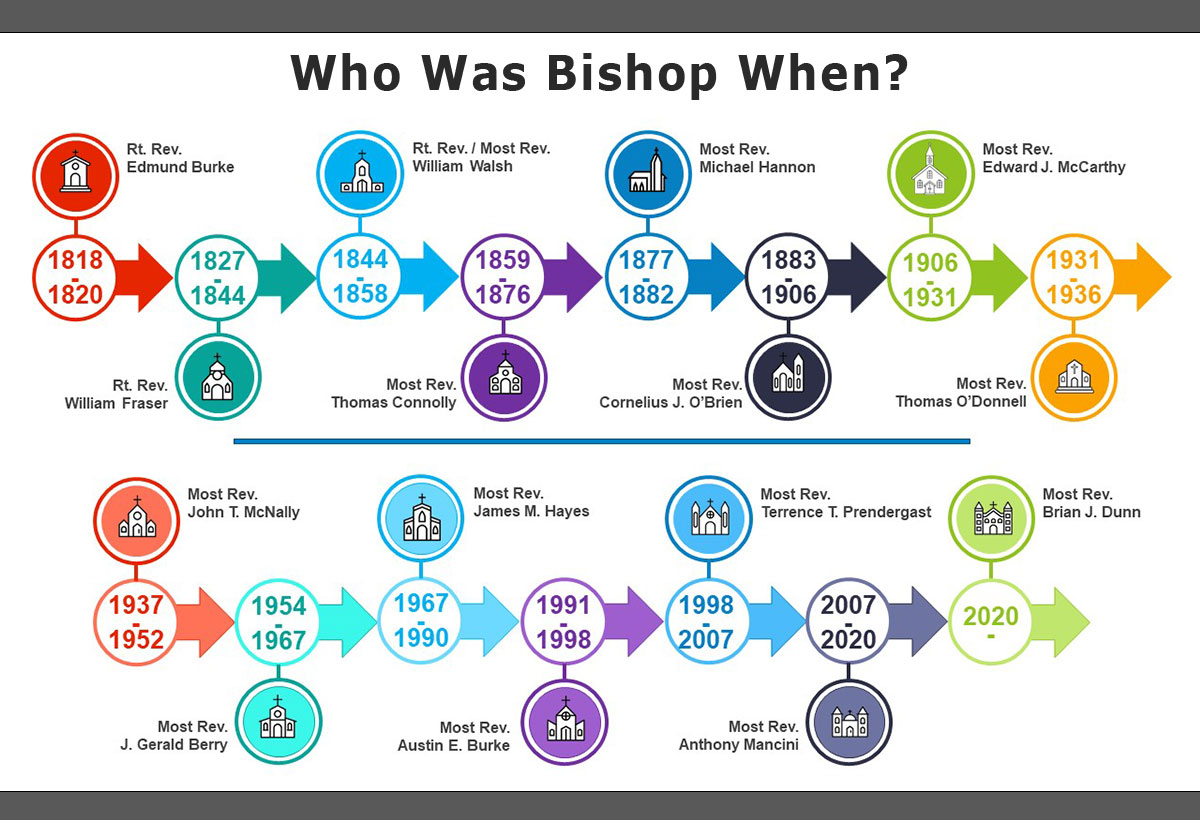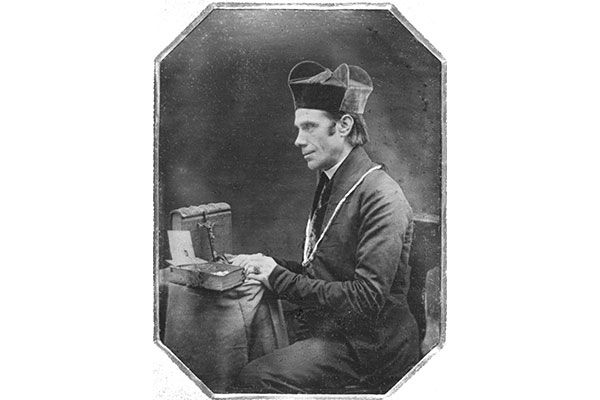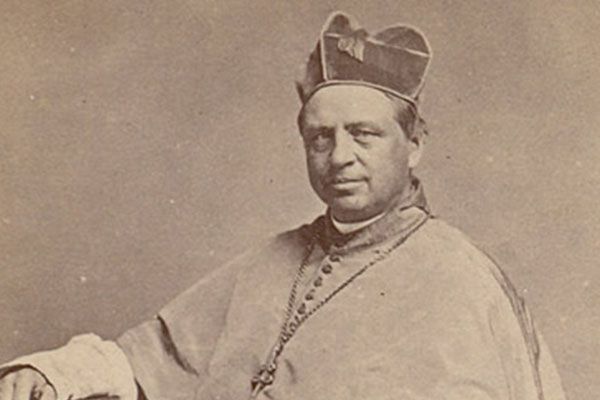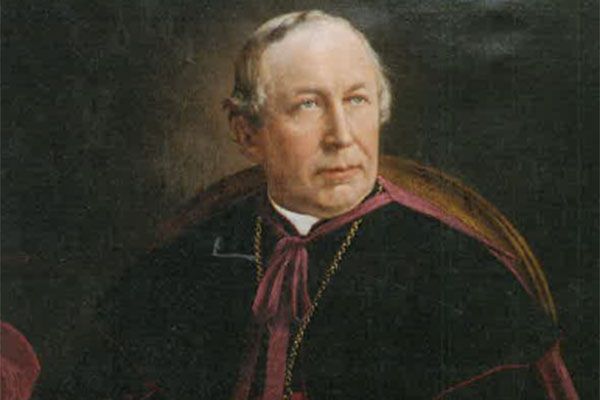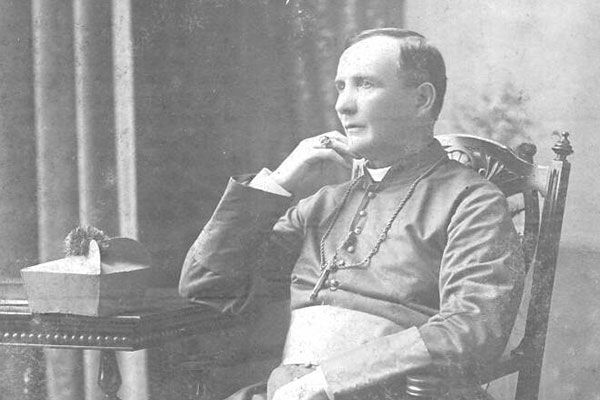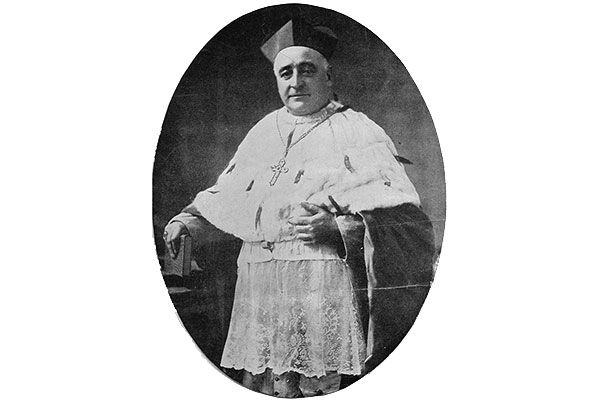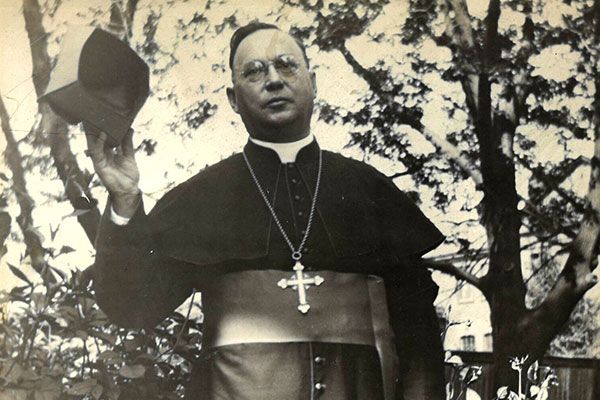Rt. Rev. William Fraser
First Bishop of Nova Scotia and Halifax
1827-1844
The time period following the death of Edmund Burke, Vicar Apostolic of Nova Scotia was an uncertain one for Nova Scotia’s Catholics. Fr. John Carroll, Bishop Burke’s nephew was appointed administrator of the Vicariate, until a suitable successor could be found.
Writing to the Propaganda Fide in Rome in July of 1824, Bishop Angus MacEachern of Charlottetown said “there is not among us one more worthy of being constituted Bishop” of that Vicariate than William Fraser; for he is a learned priest and “excellent preacher in both English and Gaelic, sound in faith and imbued “with the virtues that adorn the clerical state.’”1
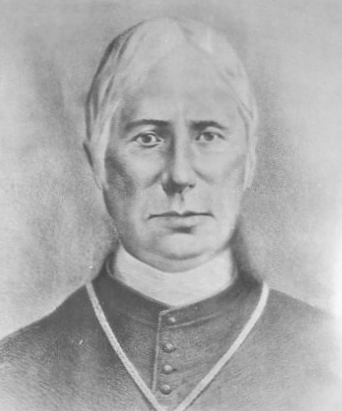 William Fraser was born in Scotland in 1779, the eldest son of a large family. (How large it was is disputed, some sources say he was the eldest of 10 children, others say there were 12.) He entered the Seminary of Samalaman in Moidart, Scotland after graduating from elementary school. He was sent to the Scot’s College in Valladolid Spain where he spent 10 years in study, and was ordained in September of 1804, at the age of 25.
William Fraser was born in Scotland in 1779, the eldest son of a large family. (How large it was is disputed, some sources say he was the eldest of 10 children, others say there were 12.) He entered the Seminary of Samalaman in Moidart, Scotland after graduating from elementary school. He was sent to the Scot’s College in Valladolid Spain where he spent 10 years in study, and was ordained in September of 1804, at the age of 25.
He came to Nova Scotia in 1822, partly in response to a request from Bishop Burke, before his death, appealing for Gaelic speaking priests to come to Nova Scotia to serve the Highlanders who had settled in the northern mainland of Nova Scotia and Cape Breton. In December of 1823, he was appointed by Fr. John Carroll to serve in the Parish at Antigonish. It was Fr. Fraser who commissioned and oversaw the building of St. Ninian’s, the current Cathedral for the Diocese of Antigonish.
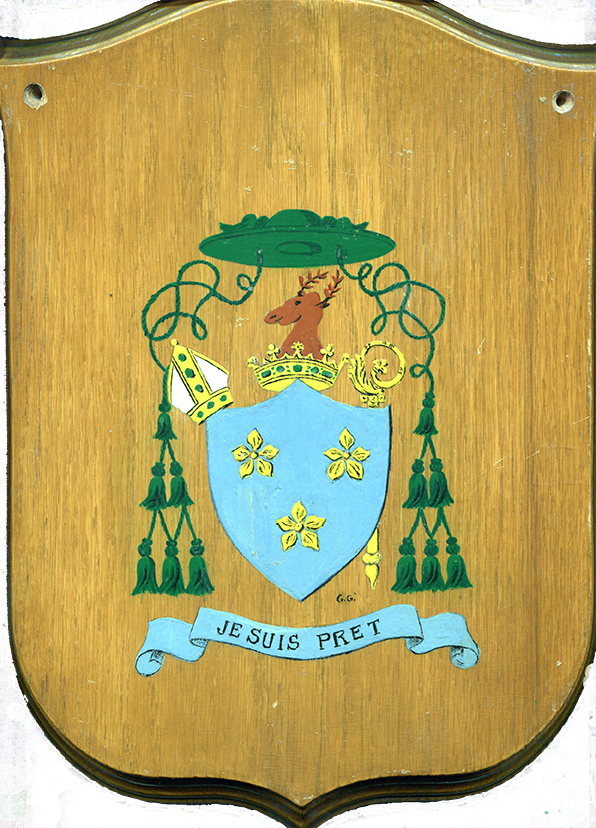
The Sacred Congregation for the Propagation of the Faith sent documents appointing Fr. Fraser the titular bishop of Tanen and the Vicar Apostolic of Nova Scotia, on May 21st, 1825. These were lost in transit. New copies were sent out in October of 1826, which were received. On the feast of John the Baptist, June 24th, 1827, the consecration of the Rt. Rev. Bishop William Fraser took place at St. Ninians, in Antiogonish, the first episcopal consecration on Nova Scotian soil.
A missionary priest at heart, he was more concerned with spiritual affairs than temporal ones, and chose to remain in Antigonish, although the seat of the Vicariate was in Halifax. This didn’t sit well with Irish Catholics in Halifax, who felt ignored and abandoned.
In December of 1827, Fr. Carroll, retired as administrator of the Vicariate. In his place, Bishop Fraser appointed Fr. John Loughnan Vicar General of Nova Scotia and sent him to Halifax.
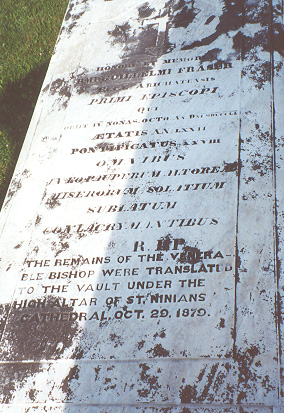 Although his entries in the burial records of the period suggest that he was a caring man, who knew and connected with his parishioners, it seem he did not get along well with his confreres. Two Irish priests, Frs. Dease and O’Brien, for whom the Catholic community in Halifax petitioned Bishop Fraser, didn’t stay long. It is widely believed that, although they were well received by the Parish, they could not abide Fr. Loughnan.
Although his entries in the burial records of the period suggest that he was a caring man, who knew and connected with his parishioners, it seem he did not get along well with his confreres. Two Irish priests, Frs. Dease and O’Brien, for whom the Catholic community in Halifax petitioned Bishop Fraser, didn’t stay long. It is widely believed that, although they were well received by the Parish, they could not abide Fr. Loughnan.
Bishop Fraser’s terse reply to a petition over 1,000 names long to re-instate Fr. Dease did not help re-assure the Irish Catholics in Halifax of his concern for them. His response concluded “The exeat will show that his retirement from my jurisdiction was voluntary on his part, and by no means compulsory on mine. Any further application to me on the subject of the selection of and appointment of clergymen to parochial duties, or ecclesiastical offices within the limit of my spiritual jurisdiction, will meet with the unqualified and well-merited contempt of your obedient servant, and sincere well-wisher, William Fraser.”2
Bishop Fraser was not entirely without support from Irish Catholics in Nova Scotia, however. Meetings were held in Pictou County, where Catholics both Irish and Scottish gathered to decry the “conduct of the Irish Catholic Schismatiks [sic] of Nova Scotia…..in their low, vulgar and detestable antinational prejudice.”3 The resolutions set down at these meetings showed unqualified support for Bishop Fraser, stating that “a more humane – a more charitable, or better Bishop cannot be found in the entire world.”4
It didn’t help matters that when the Propaganda Fide, having elevated Nova Scotia to a separate diocese, appointed an Irishman, the Rt. Rev. William Walsh, to be a coadjutor Bishop (with the right of succession) without consulting or, seemingly, informing Bishop Fraser. Bishop Walsh arrived in Halifax on October of 1842 and “was most kindly received by the worthy Doctor Fraser.” 5 He was less kindly received by the Vicar General, and his situation made very difficult.
The loyalties of Nova Scotia’s Catholics were deeply divided. It seemed the answer to a divided diocese was to, in fact, divide it, and this division happened on September 2, 1844. Bishop Walsh became, then, the Bishop of Halifax, and William Fraser the bishop of Arichat (which is now known as Diocese of Antigonish), although he chose to remain at Antigonish.
He died on October 4, 1851, and a monument in St. Ninian’s cemetery state that his remains were placed in a vault beneath the high altar of St. Ninian’s Cathedral on Oct. 29, 1879.
_________
Endnotes:
1 (A.A. Johnston, his source the Archives of the Propoganda.)
2 (Wardens Minute Book, St. Mary’s Cathedral Fond, Archdiocese of Halifax-Yarmouth Archives.)
3 (“These letters” found in the Bishop Fraser Fond, Archdiocese of Halifax-Yarmouth Archives)
4 (Ibid)
5 (Bishop Walsh’s diary, Walsh fonds, Archdiocese of Halifax-Yarmouth Archives.)
Sources:
The Right Reverend William Fraser, Second Vicar Apostolic of Nova Scotia, First Bishop of Halifax, and First Bishop of Arichat. By the Rev. A.A. Johnston, P.P.
CCHA Report 3 (1935-36), 23-30
Bishop William Fraser, Biographical sketch provided by the Archives of the Diocese of Antigonish.
The William Fraser fonds, Archdiocese of Halifax-Yarmouth Archives.
The St. Mary’s Cathedral fonds, Archdiocese of Halifax-Yarmouth Archives.
The photograph collection, Archdiocese of Halifax-Yarmouth Archives.
http://people.stfx.ca/lstanley/stones/cem-stnin-new.htm
Archives Contact
Sharon Riel
Archivist - Halifax Office
Archdiocese of Halifax - Yarmouth
(902) 429-9800 ext 314
